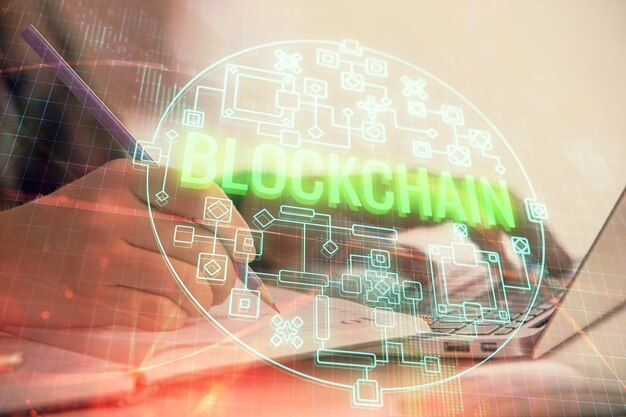
Blockchain technology has the potential to completely transform the eLearning sector by improving security, trust, and teamwork, opening up new business opportunities, and giving students better access to high-quality instruction.
Development of Blockchain Applications for Education
The eLearning sector could be greatly impacted by blockchain app development technology in several ways. See the information about them below.
Increased Safety
The transparent and decentralized nature of blockchain technology can enhance the security of e-learning platforms. It can lower the risk of fraud and data breaches by ensuring the safe storage and verification of credentials, certificates, and learner data.
Veracity And Confidence
Blockchain can make it possible to use decentralized digital identification systems to reliably verify the abilities and accomplishments of learners. This increases trust in online learning by guaranteeing that credentials and certificates are unchangeable and readily verified by employers and other educational institutions.
P2P Education And Content Distribution
Through the creation of platforms that allow learners to directly share information, resources, and material without the need for middlemen, blockchain can support peer-to-peer learning. This decentralized method lowers expenses, promotes cooperation, and increases access to high-quality educational resources.
Micropayments Along With Copyright Defense
Learning systems can use blockchain to investigate micropayment schemes in which students pay for individual courses, modules, or tests. Using smart contracts and timestamping, can safeguard the intellectual property rights of authors and encourage the production of excellent instructional materials.
Open-Book Documentation
The distributed ledger technology of blockchain allows for the safe storage and tracking of academic documents, such as degrees, certificates of completion, and qualifications. Employers may simply check credentials thanks to this open, easily alterable recordkeeping system.
Analytics of Data and Customization
Learning systems can provide valuable insights into the behaviors, preferences, and learning patterns of students by safely gathering and evaluating learner data on the blockchain. Enhancing overall learning outcomes, recommending pertinent content, and personalizing learning experiences are all possible with the use of this data.
Blockchain-Based e-Learning Applications
Blockchain technology improves efficiency, security, and trust, and can completely transform the education sector. Credential verification is one way that blockchain is being used in e-learning. Educational institutions can use blockchain technology to provide digital degrees or certificates that are safely stored on the network. Employers and other educational institutions will find it easier to confirm the legitimacy of a certificate as a result of the elimination of the necessity for manual verification procedures.
Furthermore, granting students ownership and control over their academic records can empower them. Students can save their accomplishments, credentials, or talents in a digital wallet on the blockchain. This gives students an unchangeable and visible record of their educational path, making it simple for them to show their credentials to academic institutions or prospective jobs.
Copyright protection and content sharing are two other areas where blockchain technology is being developed for e-learning. Blockchain technology can create a decentralized platform that allows teachers to safely distribute instructional materials while maintaining copyright protection and appropriate attribution. In addition to paying artists fairly for their labor, this can encourage cooperation and creativity within the learning community.
The Powerful Blending of e-Learning And Blockchain
The education sector could change because of the strong mix of eLearning and blockchain technology. The decentralized and secure characteristics of blockchain technology can improve the openness, effectiveness, and reliability of e-learning platforms.
eLearning platforms can offer tamper-proof records of student accomplishments, certifications, and qualifications by utilizing blockchain technology. Because they are kept on a distributed ledger, these documents are protected from tampering or fraud. This makes the system more dependable and verifiable by giving employers and educational institutions trust in the legitimacy of a person’s educational accomplishments.
It can also facilitate micropayments and use tokenized rewards to incentivize students, resulting in a more stimulating and engaging learning environment. After finishing courses, hitting milestones, or proving their expertise in particular fields, learners can earn tokens or digital assets. These incentives can be invested in, used to fund additional schooling, or traded for other products and services.
Additionally, peer-to-peer interactions inside eLearning platforms can be facilitated by blockchain. Blockchain makes it possible for students and teachers to communicate directly, collaborate, and share knowledge by doing away with middlemen. This decentralized strategy promotes empowerment and a sense of community, creating an eLearning ecosystem that is more open and accessible.
Furthermore, problems like plagiarism and intellectual property theft can be resolved by blockchain’s immutability and transparency. By securing copyrights and guaranteeing equitable compensation for content providers, smart contracts can promote the creation of superior instructional resources.
Blockchain’s Potential in the Education Sector
There is a lot of promise for blockchain in education in the future. Blockchain technology can provide several advantages, including better data management, higher levels of security, and more accurate verification of academic credentials. Here are a few instances of potential uses:
- Safe recordkeeping: Blockchain technology offers a decentralized, immutable ledger system that can be used to safely preserve credentials such as diplomas, certificates, and degrees. By doing this, it is ensured that the records cannot be altered or fabricated.
- Credential verification: Employers and other educational institutions may readily validate digital certificates and diplomas that educational institutions issue thanks to blockchain technology.
- Transparent evaluations: By storing time-stamped information, assessor identities, and grading standards, blockchain technology can enable transparent and verifiable evaluations. This strengthens the review process’s legitimacy and sense of trust.
- Peer-to-peer credential sharing: With blockchain technology, students may take control and ownership of their academic records. They can securely and directly share their validated credentials with other organizations or prospective employers, doing away with the need for middlemen.
- Lifelong learning and micro-credentialing: Blockchain can facilitate the development and acceptance of micro-credentials, which let people highlight certain abilities and accomplishments. This offers a more flexible and granular approach to education and job growth, which promotes lifelong learning.
It is important to remember that, despite the enormous potential, widespread blockchain use in education could still need to overcome several obstacles, such as those related to technological implementation, the creation of industry standards, and privacy issues. However, it appears that blockchain technology will revolutionize learning possibilities, certification verification, and recordkeeping in the field of education.
Conclusion
blockchain technology presents a transformative opportunity for the education sector by enhancing security, trust, and collaboration. From secure verification of credentials to decentralized content sharing and micropayment possibilities, blockchain empowers both learners and institutions. While challenges like implementation standards and privacy concerns remain, the potential for personalized learning experiences, verifiable achievements, and open educational ecosystems makes blockchain a force to be reckoned with in the future of education.






